Thailand said the number of civilians evacuated from its border with Cambodia rose to 138,000 on Friday, as both countries continued deadly strikes on each other.
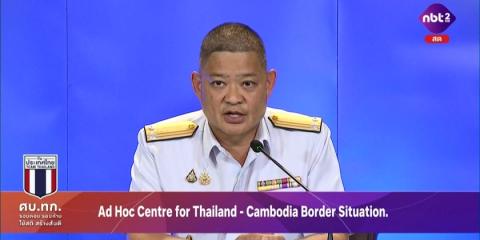
Thailand said the number of civilians evacuated from its border with Cambodia rose to 138,000 on Friday, as both countries continued deadly strikes on each other.
Rear Admiral Surasant Kongsiri, Spokesperson, Ad Hoc Centre said "The Ministry of Foreign Affairs is to downgrade diplomatic relations with Cambodia, secondly, the Ministry of Interior and related agencies are to fully assist civilians affected by the situation. And thirdly, the Ministry of Finance is to consider tax-relief measures to support private sector and public impacted by the conflict."
The Thai ministry of health added that 428 hospital patients had been evacuated from the border region since clashes began on Thursday.
mitv
Thailand said the number of civilians evacuated from its border with Cambodia rose to 138,000 on Friday, as both countries continued deadly strikes on each other.
Rear Admiral Surasant Kongsiri, Spokesperson, Ad Hoc Centre said "The Ministry of Foreign Affairs is to downgrade diplomatic relations with Cambodia, secondly, the Ministry of Interior and related agencies are to fully assist civilians affected by the situation. And thirdly, the Ministry of Finance is to consider tax-relief measures to support private sector and public impacted by the conflict."
The Thai ministry of health added that 428 hospital patients had been evacuated from the border region since clashes began on Thursday.
mitv
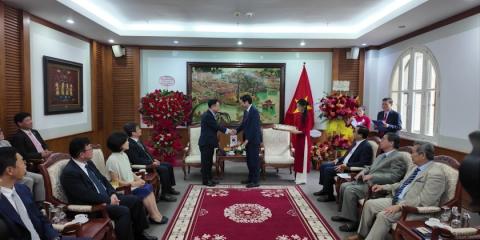
Viet Nam Ministry of Culture, Sports and Tourism awarded a commendation to Lee Chang-kun, Viet Nam's Tourism Ambassador to South Korea on Friday.
The honor recognizes his significant contributions throughout three ambassadorial terms since 2017 in strengthening tourism and cultural cooperation between the two countries. It also reflects Viet Nam’s appreciation for individuals who contribute to diplomatic and cultural ties. The ceremony highlighted the growing strategic relations between Vietnam and South Korea.
Viet Nam Ministry of Culture, Sports and Tourism awarded a commendation to Lee Chang-kun, Viet Nam's Tourism Ambassador to South Korea on Friday.
The honor recognizes his significant contributions throughout three ambassadorial terms since 2017 in strengthening tourism and cultural cooperation between the two countries. It also reflects Viet Nam’s appreciation for individuals who contribute to diplomatic and cultural ties. The ceremony highlighted the growing strategic relations between Vietnam and South Korea.
mitv
Viet Nam Ministry of Culture, Sports and Tourism awarded a commendation to Lee Chang-kun, Viet Nam's Tourism Ambassador to South Korea on Friday.
The honor recognizes his significant contributions throughout three ambassadorial terms since 2017 in strengthening tourism and cultural cooperation between the two countries. It also reflects Viet Nam’s appreciation for individuals who contribute to diplomatic and cultural ties. The ceremony highlighted the growing strategic relations between Vietnam and South Korea.
mitv
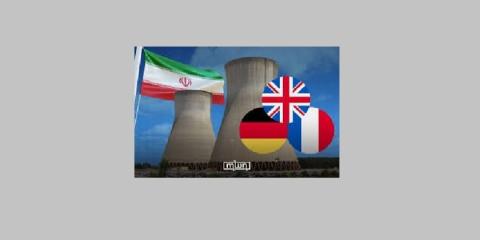
Talks on Iran's nuclear program have been stalled since Israel and the US attacked Iranian nuclear facilities last month. However, diplomats from Tehran and Europe met in Türkiye on Friday. Vice-ministerial level officials from Iran, Britain, France and Germany held a meeting for about four hours at the Iranian Consulate. Iran has been steadfast about maintaining its nuclear enrichment program.
Talks on Iran's nuclear program have been stalled since Israel and the US attacked Iranian nuclear facilities last month. However, diplomats from Tehran and Europe met in Türkiye on Friday. Vice-ministerial level officials from Iran, Britain, France and Germany held a meeting for about four hours at the Iranian Consulate. Iran has been steadfast about maintaining its nuclear enrichment program.
Reuters says the Europeans urged Iran to avoid that situation by committing to key issues, including full cooperation with the International Atomic Energy Agency and accounting for the whereabouts of highly enriched uranium, which is unknown since the strikes last month. Shortly after the meeting, Iran's Deputy Foreign Minister posted on X that the talks were "serious, frank and detailed." He said his delegation explained Tehran's "principled positions," including those on the threat of UN sanctions. He also said they agreed to continue consultations.
mitv
Talks on Iran's nuclear program have been stalled since Israel and the US attacked Iranian nuclear facilities last month. However, diplomats from Tehran and Europe met in Türkiye on Friday. Vice-ministerial level officials from Iran, Britain, France and Germany held a meeting for about four hours at the Iranian Consulate. Iran has been steadfast about maintaining its nuclear enrichment program.
Reuters says the Europeans urged Iran to avoid that situation by committing to key issues, including full cooperation with the International Atomic Energy Agency and accounting for the whereabouts of highly enriched uranium, which is unknown since the strikes last month. Shortly after the meeting, Iran's Deputy Foreign Minister posted on X that the talks were "serious, frank and detailed." He said his delegation explained Tehran's "principled positions," including those on the threat of UN sanctions. He also said they agreed to continue consultations.
mitv
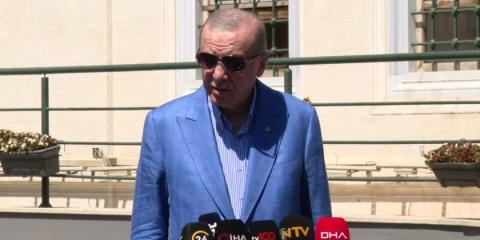
Turkish President Erdogan said on Friday that he may speak with Russian President Putin and U.S. President Trump this week to explore the possibility of holding a summit in Istanbul.
Erdogan said Turkish Foreign Minister Hakan Fidan held separate meetings with the Russian and Ukrainian delegations before the start of the third round of talks over the Ukraine crisis held in Istanbul on Wednesday. He added that, prior to their arrival in Istanbul, the Ukrainian delegation also met with him in Ankara.
Turkish President Erdogan said on Friday that he may speak with Russian President Putin and U.S. President Trump this week to explore the possibility of holding a summit in Istanbul.
Erdogan said Turkish Foreign Minister Hakan Fidan held separate meetings with the Russian and Ukrainian delegations before the start of the third round of talks over the Ukraine crisis held in Istanbul on Wednesday. He added that, prior to their arrival in Istanbul, the Ukrainian delegation also met with him in Ankara.
During the peace talks, the two sides agreed on another prisoner exchange but clashed over ceasefire terms and the prospect of a presidential summit. The Russian delegation said such a meeting is not under consideration until certain processes are completed.
mitv
Turkish President Erdogan said on Friday that he may speak with Russian President Putin and U.S. President Trump this week to explore the possibility of holding a summit in Istanbul.
Erdogan said Turkish Foreign Minister Hakan Fidan held separate meetings with the Russian and Ukrainian delegations before the start of the third round of talks over the Ukraine crisis held in Istanbul on Wednesday. He added that, prior to their arrival in Istanbul, the Ukrainian delegation also met with him in Ankara.
During the peace talks, the two sides agreed on another prisoner exchange but clashed over ceasefire terms and the prospect of a presidential summit. The Russian delegation said such a meeting is not under consideration until certain processes are completed.
mitv
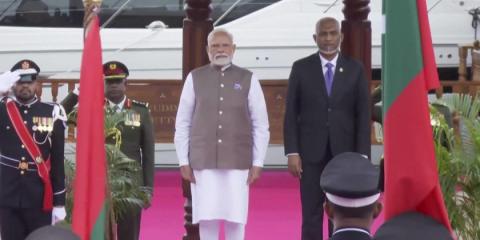
India's Prime Minister Modi offered $565 million to the Maldives on Friday to bolster its defence forces and infrastructure.
The President of the Maldives met with Modi twice last year in New Delhi, and both leaders vowed to begin a "new chapter" in bilateral ties. He also inaugurated several infrastructure projects, including roads funded by India along with a 4,000-unit housing scheme.
India's Prime Minister Modi offered $565 million to the Maldives on Friday to bolster its defence forces and infrastructure.
The President of the Maldives met with Modi twice last year in New Delhi, and both leaders vowed to begin a "new chapter" in bilateral ties. He also inaugurated several infrastructure projects, including roads funded by India along with a 4,000-unit housing scheme.
The President said the credit line from India would be used to strengthen the Maldives' security forces, improve healthcare, housing, and education. Modi is due to leave the archipelago on Saturday after attending the 50th Independence Day celebrations in the capital Male.
mitv
India's Prime Minister Modi offered $565 million to the Maldives on Friday to bolster its defence forces and infrastructure.
The President of the Maldives met with Modi twice last year in New Delhi, and both leaders vowed to begin a "new chapter" in bilateral ties. He also inaugurated several infrastructure projects, including roads funded by India along with a 4,000-unit housing scheme.
The President said the credit line from India would be used to strengthen the Maldives' security forces, improve healthcare, housing, and education. Modi is due to leave the archipelago on Saturday after attending the 50th Independence Day celebrations in the capital Male.
mitv
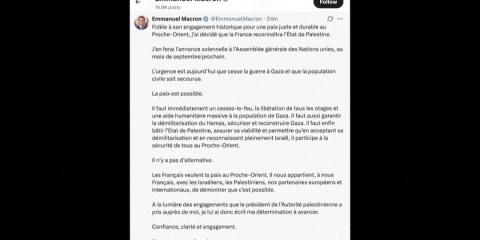
French President Macron announced on Thursday that France will officially recognize the State of Palestine during the upcoming 80th session of the United Nations General Assembly in September. Macron underscored the broader vision behind France's recognition of Palestine.
French President Macron announced on Thursday that France will officially recognize the State of Palestine during the upcoming 80th session of the United Nations General Assembly in September. Macron underscored the broader vision behind France's recognition of Palestine.
In a formal letter addressed to Palestinian President Mahmoud Abbas, Macron said the urgent need is to achieve the only viable solution (two-state solution) to meet the legitimate aspirations of the Palestinian people, put an end to terrorism and all forms of violence, and ensure lasting peace and security for Israel and the entire region.
The move follows Macron's earlier declaration in April, saying that France would recognize the Palestinian state during an international conference on Palestine, co-chaired with Saudi Arabia in New York in June. But under pressure from the United States, the international conference has been postponed until the end of July.
mitv
French President Macron announced on Thursday that France will officially recognize the State of Palestine during the upcoming 80th session of the United Nations General Assembly in September. Macron underscored the broader vision behind France's recognition of Palestine.
In a formal letter addressed to Palestinian President Mahmoud Abbas, Macron said the urgent need is to achieve the only viable solution (two-state solution) to meet the legitimate aspirations of the Palestinian people, put an end to terrorism and all forms of violence, and ensure lasting peace and security for Israel and the entire region.
The move follows Macron's earlier declaration in April, saying that France would recognize the Palestinian state during an international conference on Palestine, co-chaired with Saudi Arabia in New York in June. But under pressure from the United States, the international conference has been postponed until the end of July.
mitv
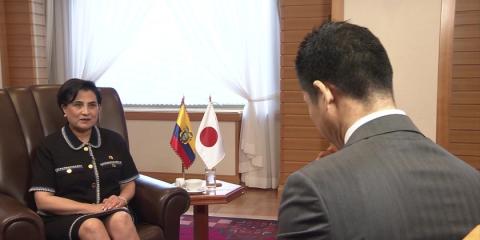
Ecuador's minister of foreign affairs and human mobility said the country needs to maintain balanced support for development from the United States and China.
Gabriela Sommerfeld spoke to the media in Tokyo on Thursday. She is the first Cabinet minister of the new administration of President Daniel Noboa to visit Japan. Noboa won reelection earlier this year. Sommerfeld said Ecuador needs more investments and trade, and for that purpose, the country has to keep good relations with its main markets.
Ecuador's minister of foreign affairs and human mobility said the country needs to maintain balanced support for development from the United States and China.
Gabriela Sommerfeld spoke to the media in Tokyo on Thursday. She is the first Cabinet minister of the new administration of President Daniel Noboa to visit Japan. Noboa won reelection earlier this year. Sommerfeld said Ecuador needs more investments and trade, and for that purpose, the country has to keep good relations with its main markets.
Asked about relations with Japan, Sommerfeld referred to more than 100 years of diplomatic relations. She expressed hope to expand areas for cooperation between the two countries and to promote Ecuador for investments from Japanese companies.
mitv
Ecuador's minister of foreign affairs and human mobility said the country needs to maintain balanced support for development from the United States and China.
Gabriela Sommerfeld spoke to the media in Tokyo on Thursday. She is the first Cabinet minister of the new administration of President Daniel Noboa to visit Japan. Noboa won reelection earlier this year. Sommerfeld said Ecuador needs more investments and trade, and for that purpose, the country has to keep good relations with its main markets.
Asked about relations with Japan, Sommerfeld referred to more than 100 years of diplomatic relations. She expressed hope to expand areas for cooperation between the two countries and to promote Ecuador for investments from Japanese companies.
mitv
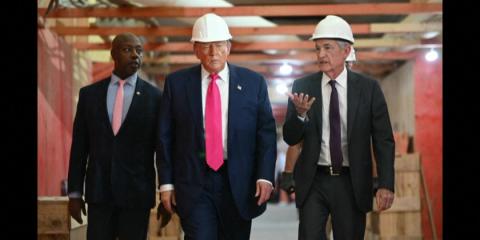
US President Donald Trump has visited the headquarters of the Federal Reserve in Washington. The Fed has long been an independent institution, but Trump has led a campaign to criticize Chair Jerome Powell. He has also questioned the cost of renovations to its headquarters.
US President Donald Trump has visited the headquarters of the Federal Reserve in Washington. The Fed has long been an independent institution, but Trump has led a campaign to criticize Chair Jerome Powell. He has also questioned the cost of renovations to its headquarters.
Trump took an inspection tour of the construction along with Powell on Thursday. It involves two historic buildings that have been undergoing renovations since 2022. The White House has accused Powell of allowing costs to balloon much higher than originally planned.
Trump and Powell spoke to the press after the tour. Powell took time to correct Trump's claim that the renovation cost has soared to 3.1 billion dollars. He said Trump was adding the cost of another building that was completed five years ago. Trump's visit to the Fed is the first by a sitting president since George W. Bush in 2006. It comes almost a week before Fed officials are set to gather for their next policy meeting.
mitv
US President Donald Trump has visited the headquarters of the Federal Reserve in Washington. The Fed has long been an independent institution, but Trump has led a campaign to criticize Chair Jerome Powell. He has also questioned the cost of renovations to its headquarters.
Trump took an inspection tour of the construction along with Powell on Thursday. It involves two historic buildings that have been undergoing renovations since 2022. The White House has accused Powell of allowing costs to balloon much higher than originally planned.
Trump and Powell spoke to the press after the tour. Powell took time to correct Trump's claim that the renovation cost has soared to 3.1 billion dollars. He said Trump was adding the cost of another building that was completed five years ago. Trump's visit to the Fed is the first by a sitting president since George W. Bush in 2006. It comes almost a week before Fed officials are set to gather for their next policy meeting.
mitv
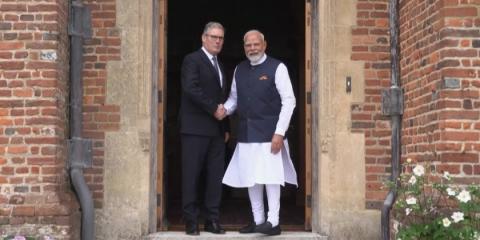
Prime Minister Keir Starmer welcomes his Indian counterpart Narendra Modi to Britain on Thursday and held a bilateral meeting at which the two countries sign a trade deal. The two leaders met at Chequers, the UK Prime Minister's country house. Modi will also meet King Charles III during his brief stay in Britain, his fourth visit since becoming India's leader in 2014.
mitv
Prime Minister Keir Starmer welcomes his Indian counterpart Narendra Modi to Britain on Thursday and held a bilateral meeting at which the two countries sign a trade deal. The two leaders met at Chequers, the UK Prime Minister's country house. Modi will also meet King Charles III during his brief stay in Britain, his fourth visit since becoming India's leader in 2014.
mitv
Prime Minister Keir Starmer welcomes his Indian counterpart Narendra Modi to Britain on Thursday and held a bilateral meeting at which the two countries sign a trade deal. The two leaders met at Chequers, the UK Prime Minister's country house. Modi will also meet King Charles III during his brief stay in Britain, his fourth visit since becoming India's leader in 2014.
mitv
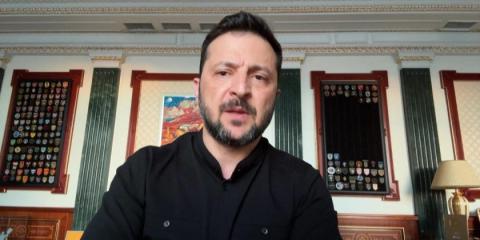
Ukrainian President Zelenskyy has submitted a new bill to restore the independence of two anti-corruption agencies. The new bill was submitted to parliament on Thursday.
It is designed to guarantee the independence of two agencies, including the national anti-corruption bureau that cracks down on corruption by government officials. The move comes as nationwide protests erupted over a law enacted on Tuesday, which places the two agencies under the control of the president-picked prosecutor general.
Ukrainian President Zelenskyy has submitted a new bill to restore the independence of two anti-corruption agencies. The new bill was submitted to parliament on Thursday.
It is designed to guarantee the independence of two agencies, including the national anti-corruption bureau that cracks down on corruption by government officials. The move comes as nationwide protests erupted over a law enacted on Tuesday, which places the two agencies under the control of the president-picked prosecutor general.
Some European countries have also voiced concerns over the legislation. The new bill limits the power of the prosecutor general. The two agencies welcomed it in a statement, saying that the bill restores all their procedural powers and guarantees their independence.
mitv
Ukrainian President Zelenskyy has submitted a new bill to restore the independence of two anti-corruption agencies. The new bill was submitted to parliament on Thursday.
It is designed to guarantee the independence of two agencies, including the national anti-corruption bureau that cracks down on corruption by government officials. The move comes as nationwide protests erupted over a law enacted on Tuesday, which places the two agencies under the control of the president-picked prosecutor general.
Some European countries have also voiced concerns over the legislation. The new bill limits the power of the prosecutor general. The two agencies welcomed it in a statement, saying that the bill restores all their procedural powers and guarantees their independence.
mitv

